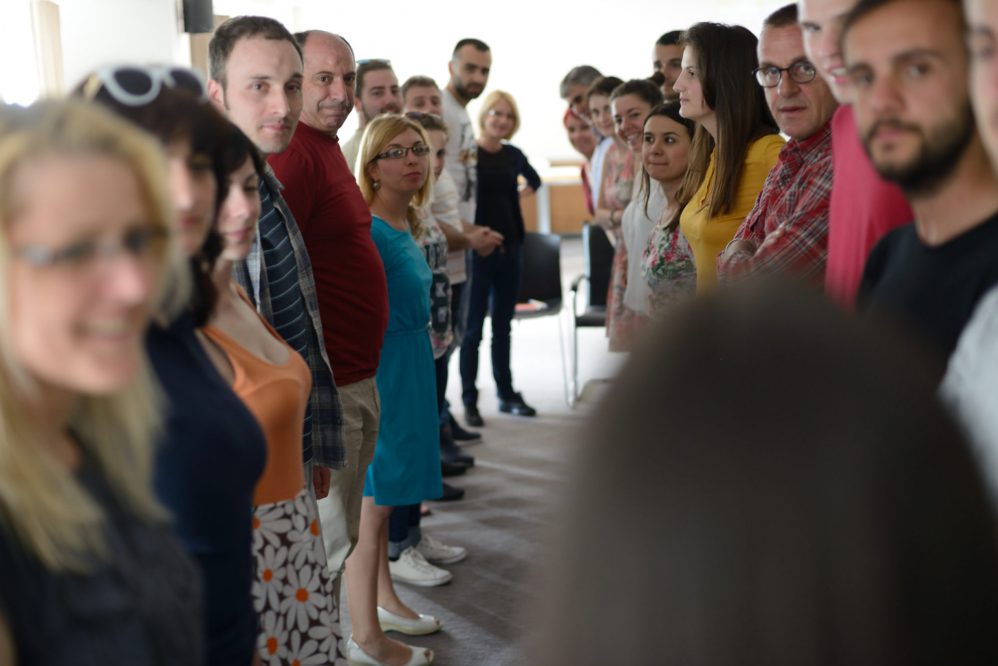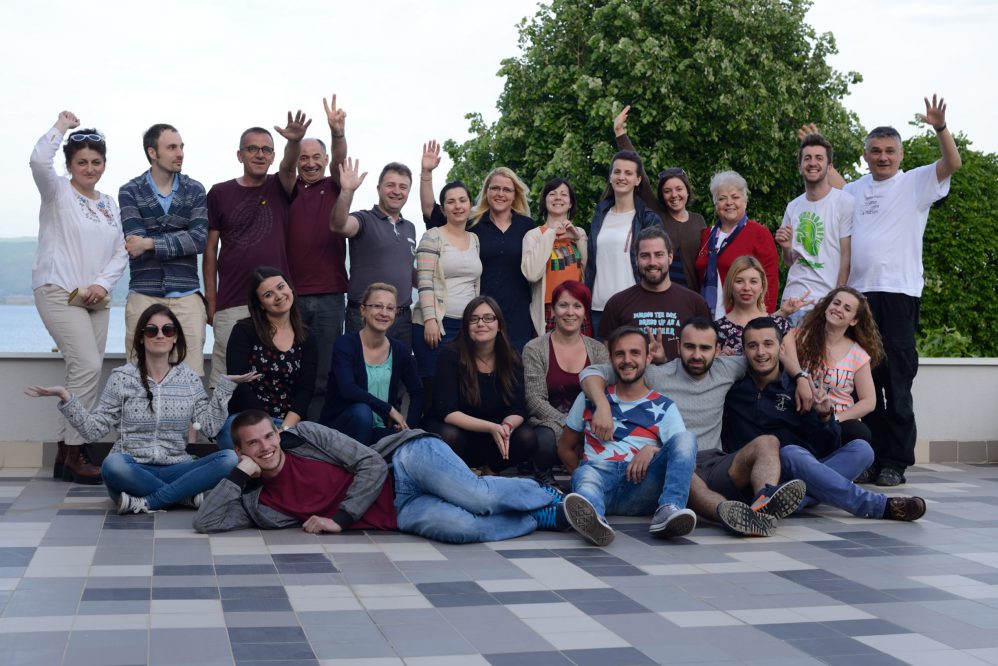The organisations Action for Nonviolence and Peacebuilding (ANP), Gnjilane, Прва детска амбасада во светот Меѓаши/FCEW Megjashi, Skopje and the Centre for Nonviolent Action (CNA), Sarajevo–Belgrade organised the second training “Introduction to Peacebuilding: Mir – Paqe – Mир 2016 “. The training was held in Dorjan from 15 to 24 April 2016. The training team included Albulena Karaga, Aleksandra Bogdanovska, Nataša Okilj, Nexhat Ismajli and Nenad Vukosavljević.
The rationale behind the training was to create an opportunity for people to meet, for dialogue and for hearing often opposing and exclusive narratives in order to reduce fear and increase trust among the participants, and to discuss change in society in these circumstances. The training was conducted with consecutive interpretation, and the participants could speak in their native language (Albanian, Macedonian or BCS).
We received 107 applications and selected 19 participants for the training. The group was gender balanced. The age structure was heterogeneous, we had participants of over 60 as well as those still in their early 20s. The diverse professional experience of the participants contributed to enriching the discussions. The Dorjan training was attended by participants from Gnjilan, Prizren, Kosovska Mitrovica, Priština, Dečani and Kosovo polje in Kosovo, from Bitola, Dolneni, Kumanovo, Skopje, Gorno Svilare in Macedonia and the participants from Serbia came from Belgrade, Leskovac, Novi Sad, Smederevo and Sremska Mitrovica. It is interesting that this year we had the largest number of applications from Kosovo, making up almost half of all applications, which we never managed to achieve before, and which was welcome encouragement for our future work.
Just before the start of the training, the president of Macedonia terminated all proceedings concerning corruption, election and political fraud, causing an outcry from the citizenry and protests in a number of cities. The turbulent political situation did not effect arrivals to the training, there were no cancellations, which we perceived as an indicator of high motivation for the training.

The training was conceived so that at the beginning, the participants would gain basic techniques in nonviolent communication and build a relationship of mutual trust in order to start a dialogue on socially sensitive topics. It was important to provide them with an opportunity to talk about sensitive topics for a number of reasons, to see what we stand to gain, to become empowered, but also because there are few opportunities to discuss sensitive topics. The topics that were discussed included communication, teamwork, decision-making, conflict, violence, prejudice, identities, gender, dealing with the past, reconciliation. We conducted exercises that contributed to the participants’ awareness about the presence of violence in society, helping them understand conflict and encouraging them to influence and change ways of thinking and parts of the existing system which is based on injustice.
The initial expectations of the training team were exceeded during the training, more content was covered than was initially planned. This was primarily due to the exceptionally motivated and diligent group of participants and an approach to guiding the process that was responsive to the needs of the group while maintaining focus on the set topical aims.
The participants at the training said that even though they live in a relatively small geographic area and even though there are practical reasons for people from opposing ethnic communities to come together, political decisions and a general climate of inter-ethnic animosity creates distances between people and prevents contacts. A small number of people who had managed to establish contacts across ethnic divided talked about the obstacles they faced. This was a valuable opportunity for training participants to gain an insight into the lives of people who are in their immediate vicinity but come from a different community, most often a minority community, and to ask themselves why they had not thought about this before and why this is not discussed in public. There were outstanding moments when people articulated the prerequisites for dealing with the past, both in terms of what they would need from people from other ethnic communities on a day-to-day level and what they were themselves prepared to give.
The high interest for the training, the atmosphere and quality of work done allowed us to conclude that we had recognised a real need and found an adequate response to it. It is sometimes difficult to change things around yourself, it may even seem impossible, but in this group we had people realising they held the power in their hands and had a chance to influence and shape the society they live in.
